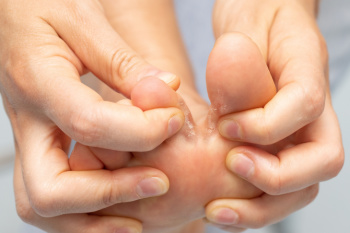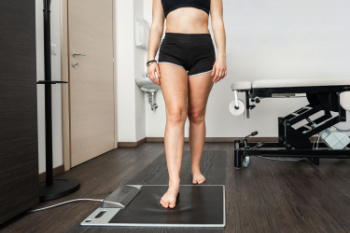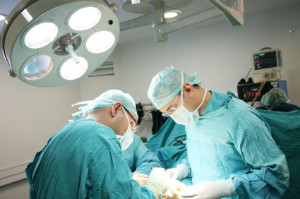Connect With Us
Blog
Items filtered by date: May 2024
The Impact of Tinea Pedis

Tinea pedis, commonly known as athlete's foot, extends its reach far beyond the realm of athletes. This fungal infection thrives in warm, moist environments, making anyone susceptible, regardless of their athletic pursuits. Individuals who frequent communal spaces like gyms, swimming pools, or shared showers are at highest risk. Preventive measures play an important role in warding off this uncomfortable infection. Keeping feet clean and dry, especially between toes, helps create an unsatisfactory environment for fungi to flourish. Wearing breathable footwear made of natural materials and changing socks regularly can minimize moisture buildup. Avoiding walking barefoot in public areas and using antifungal powders or sprays as a preventive measure can further reduce the risk of infection. Athlete’s foot can be treated by a podiatrist. If you notice signs of this uncomfortable foot condition, it is strongly suggested that you visit this type of doctor who can prescribe medication for effective treatment.
Athlete’s foot is an inconvenient condition that can be easily reduced with the proper treatment. If you have any concerns about your feet and ankles, contact one of our doctors from Intercoastal Medical Group. Our doctors will treat your foot and ankle needs.
Athlete’s Foot: The Sole Story
Athlete's foot, also known as tinea pedis, can be an extremely contagious foot infection. It is commonly contracted in public changing areas and bathrooms, dormitory style living quarters, around locker rooms and public swimming pools, or anywhere your feet often come into contact with other people.
Solutions to Combat Athlete’s Foot
- Hydrate your feet by using lotion
- Exfoliate
- Buff off nails
- Use of anti-fungal products
- Examine your feet and visit your doctor if any suspicious blisters or cuts develop
Athlete’s foot can cause many irritating symptoms such as dry and flaking skin, itching, and redness. Some more severe symptoms can include bleeding and cracked skin, intense itching and burning, and even pain when walking. In the worst cases, Athlete’s foot can cause blistering as well. Speak to your podiatrist for a better understanding of the different causes of Athlete’s foot, as well as help in determining which treatment options are best for you.
If you have any questions please feel free to contact our offices located in Bradenton, and Sarasota, FL . We offer the newest diagnostic and treatment technologies for all your foot and ankle needs.
How Foot Biomechanics Impact Mobility
 As people age, natural changes in foot biomechanics can significantly impact mobility and overall quality of life. The feet may lose padding and elasticity in the soft tissues, which can make walking uncomfortable due to the decreased cushioning. The arches of the feet may also flatten, a condition known as adult-acquired flatfoot. Flat feet can lead to changes in gait and increased strain on the ankles, knees, and hips. Additionally, conditions like arthritis may lead joints in the feet to stiffen and become less flexible, further limiting motion and causing pain during movement. These biomechanical changes can increase the risk of falls, reduce independence, and limit activities in older adults. Podiatrists play a key role in addressing these age-related changes by suggesting targeted treatment strategies. Included are prescribing orthotic devices to support weakened arches, recommending appropriate footwear to enhance stability and cushioning, and offering exercises to strengthen foot muscles and maintain joint flexibility. Regular check-ups with a podiatrist help manage these changes effectively, ensuring better mobility and reducing the risk of injury as one ages. If you are experiencing changes in your feet and mobility, it is suggested that you make an appointment with a podiatrist.
As people age, natural changes in foot biomechanics can significantly impact mobility and overall quality of life. The feet may lose padding and elasticity in the soft tissues, which can make walking uncomfortable due to the decreased cushioning. The arches of the feet may also flatten, a condition known as adult-acquired flatfoot. Flat feet can lead to changes in gait and increased strain on the ankles, knees, and hips. Additionally, conditions like arthritis may lead joints in the feet to stiffen and become less flexible, further limiting motion and causing pain during movement. These biomechanical changes can increase the risk of falls, reduce independence, and limit activities in older adults. Podiatrists play a key role in addressing these age-related changes by suggesting targeted treatment strategies. Included are prescribing orthotic devices to support weakened arches, recommending appropriate footwear to enhance stability and cushioning, and offering exercises to strengthen foot muscles and maintain joint flexibility. Regular check-ups with a podiatrist help manage these changes effectively, ensuring better mobility and reducing the risk of injury as one ages. If you are experiencing changes in your feet and mobility, it is suggested that you make an appointment with a podiatrist.
If you have any concerns about your feet, contact one of our doctors from Intercoastal Medical Group. Our doctors can provide the care you need to keep you pain-free and on your feet.
Biomechanics in Podiatry
Podiatric biomechanics is a particular sector of specialty podiatry with licensed practitioners who are trained to diagnose and treat conditions affecting the foot, ankle and lower leg. Biomechanics deals with the forces that act against the body, causing an interference with the biological structures. It focuses on the movement of the ankle, the foot and the forces that interact with them.
A History of Biomechanics
- Biomechanics dates back to the BC era in Egypt where evidence of professional foot care has been recorded.
- In 1974, biomechanics gained a higher profile from the studies of Merton Root, who claimed that by changing or controlling the forces between the ankle and the foot, corrections or conditions could be implemented to gain strength and coordination in the area.
Modern technological improvements are based on past theories and therapeutic processes that provide a better understanding of podiatric concepts for biomechanics. Computers can provide accurate information about the forces and patterns of the feet and lower legs.
Understanding biomechanics of the feet can help improve and eliminate pain, stopping further stress to the foot.
If you have any questions please feel free to contact our offices located in Bradenton, and Sarasota, FL . We offer the newest diagnostic and treatment technologies for all your foot and ankle needs.
Get Professional Care for a Broken Foot or Ankle
Surgical Offloading Procedures for Diabetic Foot Ulcers

Diabetic foot ulcers pose a significant challenge in managing diabetes, often leading to severe complications if left untreated. Among the array of treatment options, surgical offloading procedures stand as a critical intervention. These procedures involve relieving pressure from the affected area, allowing the ulcer to heal effectively. Surgeons may opt for techniques, such as tendon lengthening and bone resection. By redistributing weight-bearing forces, these surgeries alleviate stress on the ulcer, promoting tissue repair and reducing the risk of infection. While surgical intervention may seem daunting, it offers a vital opportunity for individuals with diabetic foot ulcers to regain mobility and prevent further deterioration. Additionally, when coupled with comprehensive diabetic foot care, including proper wound management and glycemic control, these procedures enhance the prospects of successful ulcer healing and minimize the likelihood of recurrence. If you have diabetes and have developed a foot wound, it is strongly suggested that you consult a podiatrist who can help you determine if this type of foot surgery is right for you.
Foot surgery is sometimes necessary to treat a foot ailment. To learn more, contact one of our doctors of Intercoastal Medical Group. Our doctors will assist you with all of your foot and ankle needs.
When Is Surgery Necessary?
Foot and ankle surgery is generally reserved for cases in which less invasive, conservative procedures have failed to alleviate the problem. Some of the cases in which surgery may be necessary include:
- Removing foot deformities like bunions and bone spurs
- Severe arthritis that has caused bone issues
- Cosmetic reconstruction
What Types of Surgery Are There?
The type of surgery you receive will depend on the nature of the problem you have. Some of the possible surgeries include:
- Bunionectomy for painful bunions
- Surgical fusion for realignment of bones
- Neuropathy decompression surgery to treat nerve damage
Benefits of Surgery
Although surgery is usually a last resort, it can provide more complete pain relief compared to non-surgical methods and may allow you to finally resume full activity.
Surgical techniques have also become increasingly sophisticated. Techniques like endoscopic surgery allow for smaller incisions and faster recovery times.
If you have any questions please feel free to contact our offices located in Bradenton, and Sarasota, FL . We offer the newest diagnostic and treatment technologies for all your foot and ankle needs.
Preventing Falls Room by Room

Preventing falls within the home is essential for maintaining safety and well-being, especially for older adults. The feet can be injured during a fall, and it is beneficial to remove obstacles in the household. Each room presents unique hazards that require attention to minimize the risk of accidents. In the bathroom, installing grab bars and non-slip mats can prevent slips and falls on wet surfaces. In the kitchen, keeping floors clean and dry and storing frequently used items within easy reach can reduce the likelihood of accidents while cooking or reaching for items. It is important for the bedrooms to have adequate lighting, and removing clutter from pathways can prevent tripping hazards, particularly during nighttime visits to the bathroom. Living areas benefit from having secure rugs or carpeting and maintaining clear pathways to prevent tripping over furniture or cords. If you have foot pain from a fall that has happened, it is suggested that you visit a podiatrist who can offer you appropriate treatment options, in addition to discussing fall prevention methods that can protect the feet.
Preventing falls among the elderly is very important. If you are older and have fallen or fear that you are prone to falling, consult with one of our doctors from Intercoastal Medical Group. Our doctors will assess your condition and provide you with quality advice and care.
Every 11 seconds, an elderly American is being treated in an emergency room for a fall related injury. Falls are the leading cause of head and hip injuries for those 65 and older. Due to decreases in strength, balance, senses, and lack of awareness, elderly persons are very susceptible to falling. Thankfully, there are a number of things older persons can do to prevent falls.
How to Prevent Falls
Some effective methods that older persons can do to prevent falls include:
- Enrolling in strength and balance exercise program to increase balance and strength
- Periodically having your sight and hearing checked
- Discuss any medications you have with a doctor to see if it increases the risk of falling
- Clearing the house of falling hazards and installing devices like grab bars and railings
- Utilizing a walker or cane
- Wearing shoes that provide good support and cushioning
- Talking to family members about falling and increasing awareness
Falling can be a traumatic and embarrassing experience for elderly persons; this can make them less willing to leave the house, and less willing to talk to someone about their fears of falling. Doing such things, however, will increase the likelihood of tripping or losing one’s balance. Knowing the causes of falling and how to prevent them is the best way to mitigate the risk of serious injury.
If you have any questions, please feel free to contact our offices located in Bradenton, and Sarasota, FL . We offer the newest diagnostic and treatment technologies for all your foot care needs.

